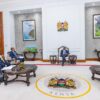KAMPALA, Aug 12 – The suspected mastermind of the July 11 bomb attacks in Kampala said on Thursday he was driven by "rage against the Americans" as Ugandan authorities declared all suspects in the blasts had been arrested.
Issa Ahmed Ruyima said he was a member of Somalia\’s Islamist insurgent group Shebab, which has claimed responsibility for the double suicide blasts that killed 76 people on the evening of the football World Cup final.
Ruyima, 33, identified as the ring-leader of the attack gang, was presented to the media with three other suspects by Ugandan authorities who said all those behind the blasts had been captured.
Ruyima left fighting in Somalia, crossed into Kenya in April and stayed in Mombasa, but was told by his Somali superiors he had to move on to Kampala.
In Kampala, he lived in a safe house where he planned and coordinated the attacks, and on the D-day he dispatched his brother to take an explosive to a venue in Kampala, but that bomb failed to explode.
He sent another man, Idris Nsubuga, along with a suicide bomber to a bar.
"My rage was against the Americans whom I deemed were responsible for all the sufferings of Muslims around the world," said Ruyima who he left Kampala the day before the blasts.
Nsubuga, a 30-year-old Ugandan, also presented at the press conference, said he was recruited at a time he had family problems and emotional distress.
"At the time I was unemployed. I was emotionally distressed. I had problems. A lot of misunderstandings with my wife," he said.
Plans for the attacks began after June 25 as the gang started surveying Kampala entertainment spots they would hit.
"He first specified Americans, where Americans hang out, then he generalised whites, where whites hang out," said Nsubuga, referring to the mastermind Ruyima.
"He wanted to punish the Ugandan government as well as the Americans for their involvement in Somalia."
Two suicide bombers, one Kenyan and the other a Somali, would eventually blow themselves up at two venues: the Kenyan at an Ethiopian restaurant and the Somali at a Rugby Club, where Nsubuga also detonated an explosive.
The Somali man "seemed very excited" when shown his target, Nsubuga said.
On the eve of the attacks, the worst in East Africa in 12 years, Nsubuga went to the safe house where he was handed a mobile phone with the name "BETI" which he was to call once the first blast went off to detonate a bomb.
The Somali said he would blow himself up at 11:15 pm. After a final exchange with his accomplice, Nsubuga stepped out of the bar and waited.
"I called a friend just to relieve myself of tension, just to know how the match was," he said. "That\’s when the first blast went off.
"I reached my pocket, grabbed that phone and called that number. That\’s when the second blast went off.
"I didn\’t want to be called a traitor by those people," he said, adding that he then went home to his wife, destrotyed his phone and watched TV.
"Then at some interval we switched to (a channel) and they were breaking news and started showing live pictures."
The Shebab, who pledge allegiance to Al-Qaeda leader Osama bin Laden, said the blasts were intended to punish Uganda for deploying troops for the African Union forces in the Somali capital Mogadishu.
"We have apprehended all those responsible for the planning and execution of these cowardly attacks." James Mugira, head of military intelligence, told reporters.
He however did not say how and when the arrests were made.
Three Kenyans have also been arrested in connection with the explosions and were charged on July 30 by a Kampala court with 76 counts of murder in the first such cases against suspects in the deadly attacks.
The three were traced through a mobile phone that was found alongside an unexploded suicide vest at what would have been a third attack site in Kampala.
































